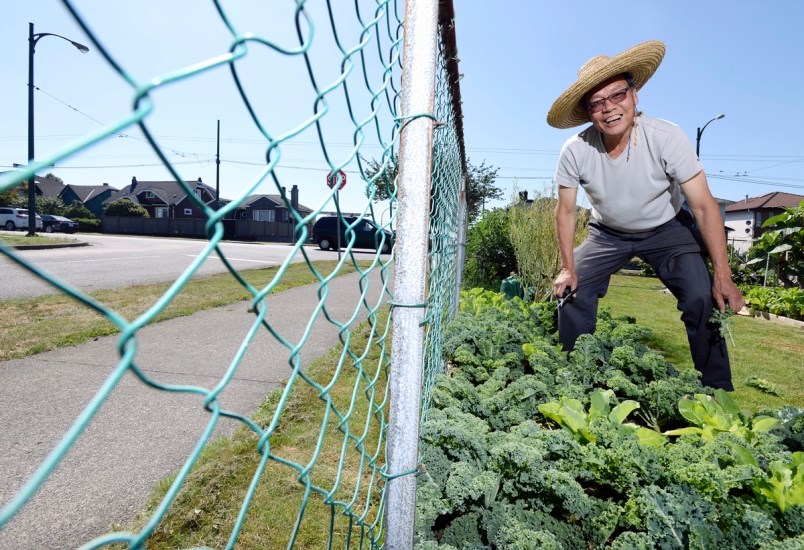In the hundreds, if not thousands, of stories the Courier publishes every year, there is one common thread. People. We talk with a lot of people. To date, we have never interviewed a policy or statistic. We have never scribbled down a scintillating quote from a building. And feelings, essences and auras are notoriously unreliable. Here’s a small sample of the most compelling things people — politicians, refugees, artists, athletes, even a wiener dog owner — have told us this year.
CITY LIVING
I went over and I saw something I did not expect to see — a lineup of roughly 50 individuals, all looking to rent the same place. It was shocking and overwhelming for me because it wasn't just students. It was people that have gotten their degrees, it was individuals who have kids, who have established careers. As a student, it was disheartening.
— Dario Garousian, a third-year UBC student on his hunt for a place to rent in Vancouver.
This is the front lines for people still trying to keep it together. They've still got a car and they're going to try and make that work, but your ability to find work gets harder and harder the more you're living like this. It gets to be a pretty desperate story.
— Coun. Andrea Reimer after talking to a person living in a car during the city's annual homeless count.
I just wanted to be really clear, almost all Vancouverites will not pay the empty homes tax. This is only going to apply to those with second or third homes that are sitting empty, or empty most of the year.
— Mayor Gregor Robertson on the city's empty home tax, a measure to encourage property owners to rent out their homes to ease the rental crisis in Vancouver.
We’re going to need significant action to address the market that has basically taken the option for home ownership, and even rental, away from many people in our city.
— Mayor Gregor Robertson introducing the city’s new vacant homes tax.
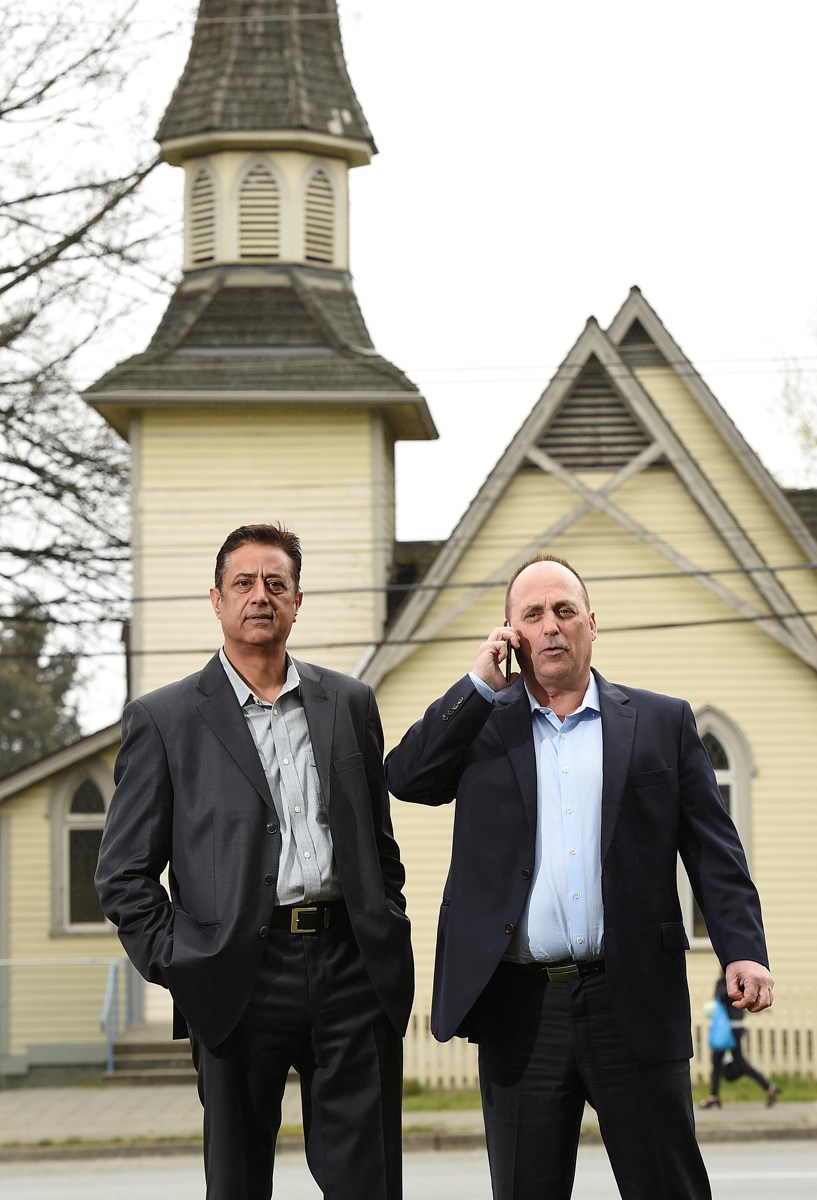
— Rav Rampuri, who operates Holy Realtors with his business partner Leonardo Di Francesco, selling religious properties for the past 21 years. Photo Dan Toulgoet.
If we had a website, I wouldn’t be able to sleep.
— Sharon Xie who runs AB Scale Model with her husband, making architectural models for developments 24 hours a day, seven days a week.
The real standout this year would be the market movement for single-family properties. You would probably have to go back — if you went back to 1980, there's probably only two or three other times when single-family properties in Vancouver have moved by this much this quickly.
— Jason Grant, regional assessor for B.C. Assessment, on how single-family property assessments had skyrocketed.
The first step is to really deal with the foreign money. This is what has been driving everything else. It’s driven a lot of speculation, both foreign and local speculators in terms of our housing market. Our homes are being treated like piggy banks by a lot of foreign investors. It’s madness that we’re doing that.
— Justin Fung, a member of HALT — Housing Action for Local Taxpayers, which staged a housing rally called #HALT the Madness.
I actually think the city planner's role or the chief planner's role — whatever jurisdiction you're in they call it slightly different things — it's kind of a twin role. [It's] to provoke possibilities, but at the same time really be a convener where you're not only welcoming but excavating other opinions and mining those for what's behind them, what's underneath them and what the real possibilities are.
— Gil Kelley, the city’s new chief planner.
People referred to him as a bright light that people were drawn to, like bees to a flame or bees to honey. He charmed everybody from his colleagues to his clients to the leaders in the community — everyone in the community, regardless of their background or social position. He really had time for everybody. We frankly all learned [from him] and owe such a debt to him because he saw the value of everyone and what they could bring to help us design a project.
— Michael Heeney, a principal at Bing Thom Architects, on Bing Thom’s death.
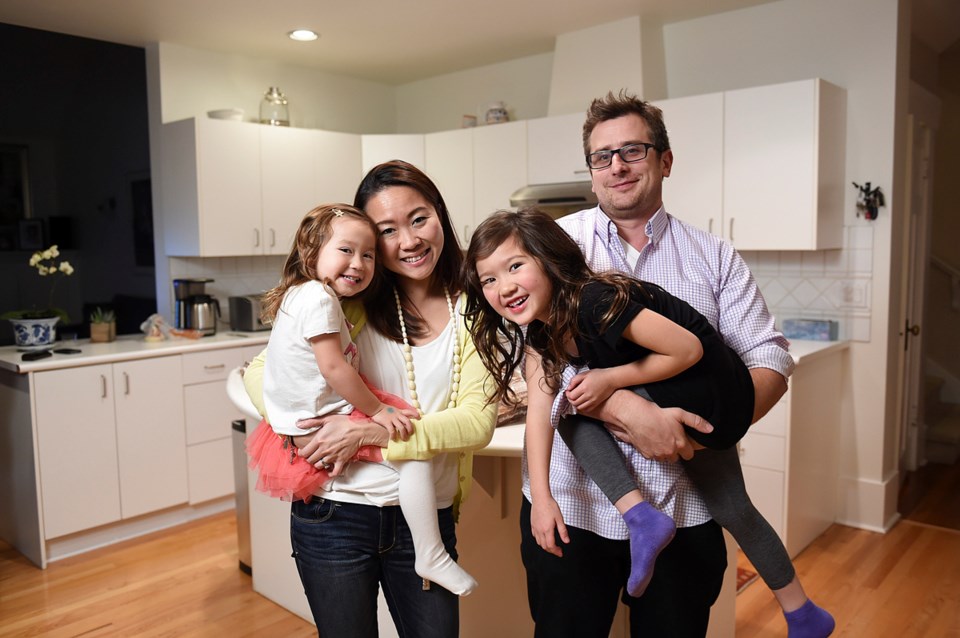
— Mike Lang about his desire to live in a “cohousing lite” building. Photo Dan Toulgoet.
The point of regulation is to protect people, it’s to protect consumers. It is not a right when it comes to self-regulation. Self-regulation is very much a privilege that’s granted on behalf of the public by government to professions that say they can do the job and prove that they can do the job. Well, the real estate sector has had 10 years to get it right on self-regulation and they haven’t. So we are going to end the right of the real estate sector to self-regulate.
— Premier Christy Clark on the province’s decision to end the real estate industry’s ability to self-regulate.
It's important for us to try and preserve a little bit of where we came from in the City of Vancouver because we spend so much time looking forward and trying to figure out how we can be the latest and greatest in whatever it is. [But], we can't forget where we came from. I'm not going to pretend for a moment that every old thing in the city can be saved, or should be saved, for that matter. But there's a history attached to the house with prominent families back in the day. And, it happens to be an excellent example of a house that's largely unchanged from when it was built. It's worthy of keeping. So, some of it's personal interest and, like I've said, I think now I've actually got a project form that the city's prepared to support and that is viable.
— Developer James Evans on his heritage revitalization proposal that would see the historic Wilmar estate house and coach house restored and five infill buildings added to the lot.
Housing is first and foremost about homes. It’s not just a commodity to make money with and we’re going to make sure that those who treat housing as a business are treated and taxed accordingly for that use.
— Mayor Gregor Robertson on the city’s plan to implement an empty home tax with or without the province.
I was astonished to think I had found 410 houses and that's just one person. If everybody was doing this, the whole city would look like it had a bad case of the measles.
— Caroline Adderson, of the Facebook page Vancouver Vanishes, on an interactive map tracking demolished character homes.
HOME FRONT
My kids were terrified and used to hide in closets. Now, they are able to sleep. I'm not worried about them. They have smiles all the time.
— Mansour Arafa on settling with his family in the 2400 Court Motel on Kingsway after fleeing Homs, the western Syrian city largely reduced to rubble in the country's ongoing civil war.
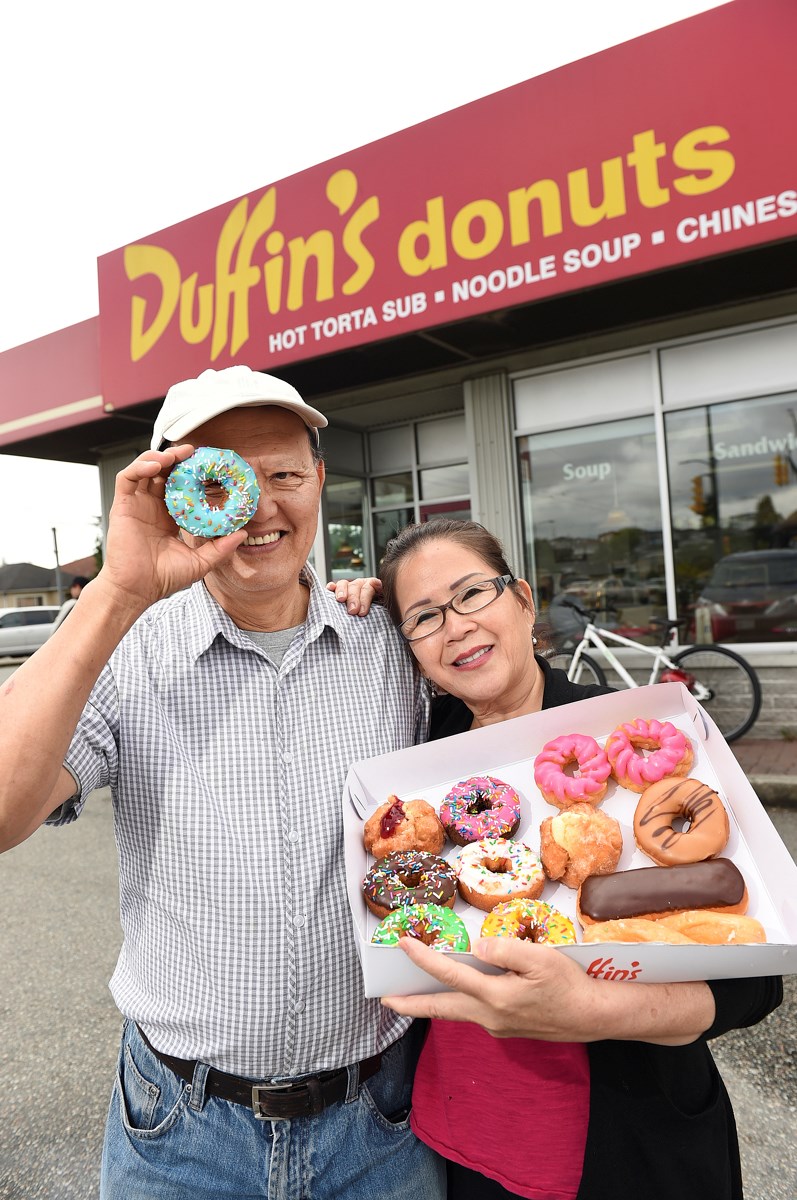
— Paula Sim, who left Cambodia with her husband and now owns Duffin’s Donuts. Photo Dan Toulgoet.
This [recognition] is not something our family has advocated for publicly. But I think it's great. We're really humbled by the honour. This is something that's permanent and we're honoured by that in this great city that we grew up in. Hopefully, it serves as a reminder of the work that needs to be done moving forward, especially as we get more and more refugees coming and more immigrants coming. We have to continue on with that work to serve these vulnerable populations.
— Daniel To, after his mother Lilian To, was honoured with a street moniker and plaque at the entrances to Shanghai Alley. She was a driving force behind the immigrant aid organization S.U.C.C.E.S.S. before she died in 2005.
RECONCILIATION
It's been a very interesting and steep learning curve for me in how we as a city can do this work. We're figuring this out as we go and there are probably areas where we'll screw up. But there's opportunities for us to strengthen those relationships.
— City manager Sadhu Johnston on the city's reconciliation efforts with First Nations.
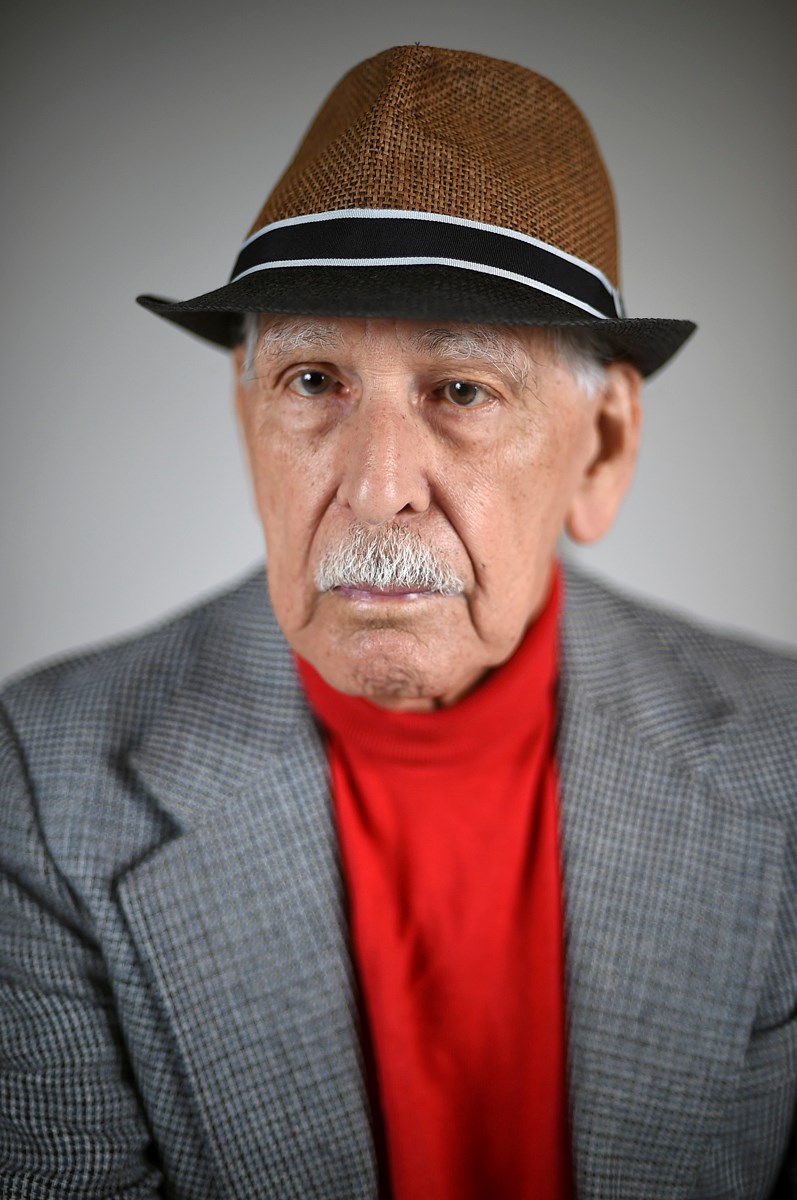
— First Nations elder Bill Lightbown on reconciliation. Photo Dan Toulgoet.
Dealing with death has been a battle throughout my whole life; it seems to be a constant factor in everything I’ve dealt with. Going through what I went through, it seemed like nothing would ever go my way with regards to family, friends and some of my closest friends dying. You get depressed and things go dark. Basketball seemed to be the only place I could go to.
— Gene Wolff, a Team Vancouver basketball player who participated in the inaugural Haico World Indigenous International Basketball Challenge.
I think in Canada people intuitively want to believe that the land is special. In the U.S., they’re patriotic about their nation-state, about being Americans. But in Canada, we are patriotic about the land. I think that’s a First Nations value.
— Rev. Ray Aldred, head of the indigenous studies program at the Vancouver School of Theology.
DRUG POLICY
We have a lot of great programs in place with Vancouver Coastal Health. But the one gap that we do have is with treatment on demand. We don't have a city where if somebody is addicted to drugs and they need help and they come forward to a police officer, or just want to self-report and get help, they don't have anywhere to go.
— Police Chief Adam Palmer on the spike in property crime and how it is largely being fueled by drug users to feed their addiction.
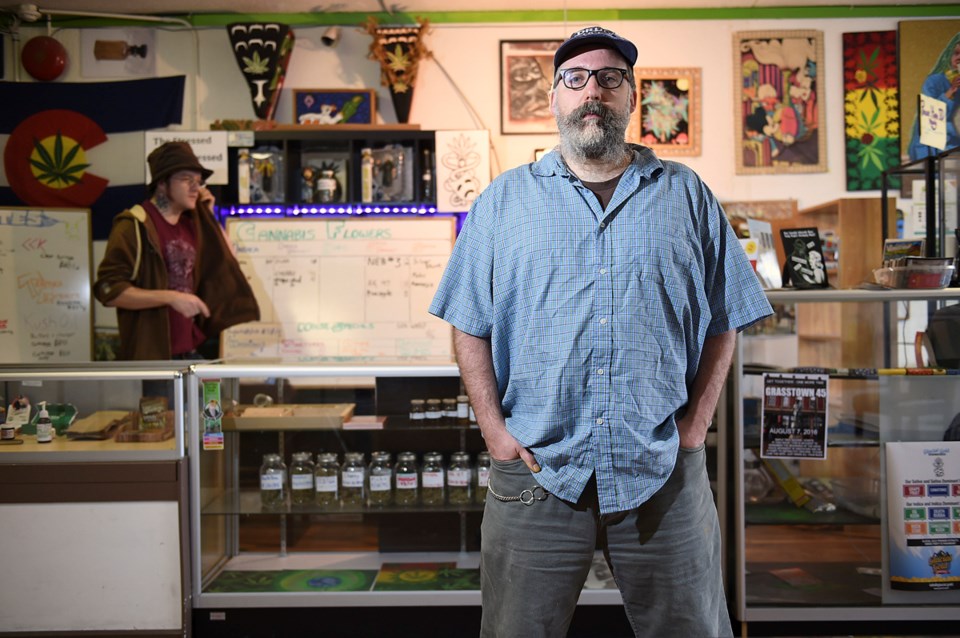
— Marijuana dispensary owner David Malmo-Levine on wanting the VPD to return his marijuana that was taken in a robbery and later recovered by police. Photo Dan Toulgoet.
If someone's angry, that's fine. But then it took a different turn — 'I'm going to come and get you, we're going to find you,' things like that, which crosses the line.
— Coun. Kerry Jang on being threatened by people upset with the city's new rules to regulate marijuana dispensaries. The threats led to city hall's corporate security team implementing a security plan for Jang and his family.
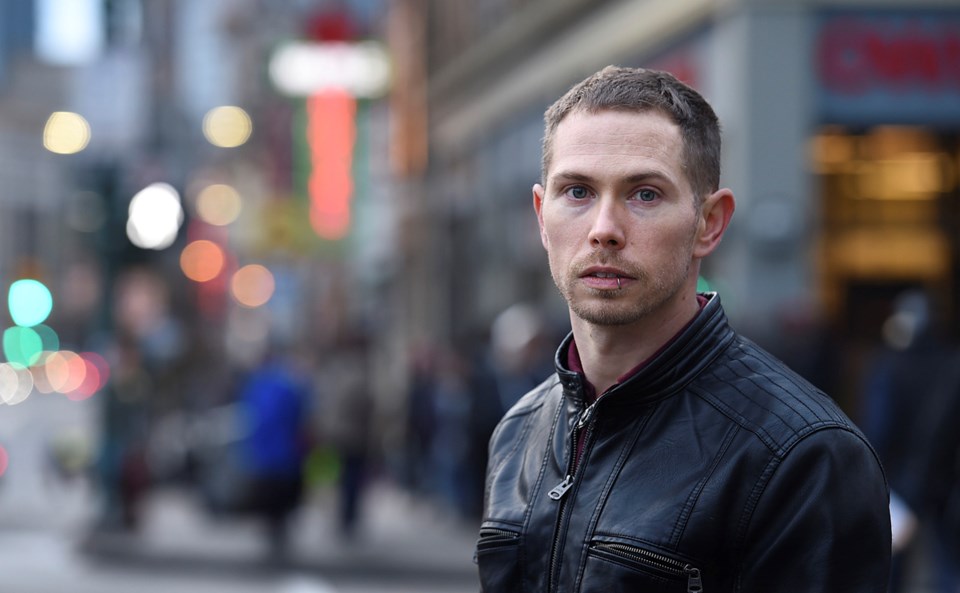
— Mark Hughes, on how stand-up comedy helped transform his life. Photo Dan Toulgoet.
POLITICAL CLIMATE
Just the tenor of the politics right now is so toxic and has really reached a boiling point. I think we all need to do anything we can to steer the outcome. Casting a vote from across the border is the one way I can do it. I can't imagine a Trump presidency, and it scares me.
— Kaye Krishna, the city's new general manager of development services, who is originally from Ohio and voted in the U.S. election.
What we have witnessed from the Vancouver School Board is a misplaced focus on political tactics rather than responsible stewardship.
— Education Minister Mike Bernier after nine school board trustees were fired in October.
If I thought this project was unsafe for the B.C. coast, I would reject it.
— Prime Minister Justin Trudeau on approving the Kinder Morgan Trans Mountain pipeline expansion project, which will almost triple the amount of oil being pumped from Alberta to Burnaby and increase tanker traffic in Vancouver waters from an average of five per month to 34.
Finally I said, ‘Would you ever even consider me as a teammate and not just a vote?’
— Erin Shum, elected to the Park Board as an NPA commissioner
SPORTING LIFE
This is real life — real people drink, real people do drugs and real people make bad decisions. If you are going to engage an opponent, you engage as hard as you can, as fast as you can and you destroy that person.
— Jonathan Fader, co-owner and instructor at Urban Tactics Krav Maga.
I set goals and see them through. I like to say you either lead, follow or get out of the way. There isn’t really an alternative.
— Floris van Weelderen, who took up a boxing course to help alleviate the symptoms of Parkinson’s disease.
We’re treated like royalty and everyone has been really appreciative with our level of play. This is the experience of a lifetime, and these kids will take away many, many memories that they’ll have for the rest of their lives.
— Vito Bordignon, Hastings Little League baseball team coach after his team was eliminated from the Little League World Series.
People definitely come for the cats over the yoga. All of our teachers were kinda thrown off by that because, well, you just can’t ask people to close their eyes in class — that’s just not fair.
— Instructor Emmanuelle Rousseau, who led a yoga class called Cats on Your Mats, where cats mingle with participants
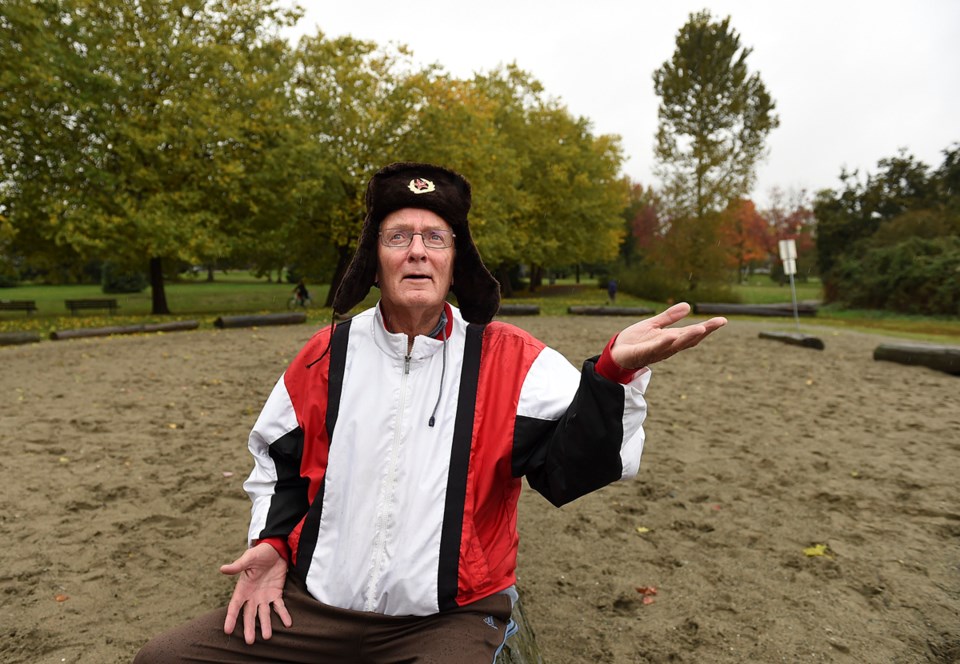
— Ken Elmer, retired elementary school P.E. teacher and volunteer race director for the annual Trout Lake cross-country meet at John Hendry Park. Photo Dan Toulgoet.
You have to be fit to play baseball but you don’t get fit playing baseball.
— Sean Elbe, co-director with the East Vancouver Baseball League
I think everyone is a nerd in their own way — jocks are just nerds for athletics.
— Fred Cholowski , drum major with the Thunderbird Marching Band
What we represent is heart over height because we feel that we play with more heart and we don’t have any height.
— Daniel David, St. Patrick’s Celtics shooting guard
It ain’t my body that’s injured
— Cedrick Henderson, Hamber Griffins quarterback

— Jules Duong, Britannia Bruins point guard. Photo Dan Toulgoet.
FOR THE HISTORY BOOKS
If the watch ever comes over to Canada, it will be another aspect of completion, but for us, we know the story and we can put that to rest — that’s the most important thing.
— Ross Chapman upon hearing the news that a watch belonging to his wife’s uncle, Henry Law, had been found in Holland 70 years after Law’s plane was shot down in the Second World War.
Everybody is free. You can get jobs. You can buy any type of food, you can buy a car — I could go on forever. If you work hard in Canada, very likely everything in your life will be beautiful.
— Antal Kozak, former assistant dean of the UBC forestry faculty, reflects on fleeing Hungary and his subsequent life in Canada
I do think though, looking back on it, it’s become history now. It’s in the history books. And for my grandchildren and great-grandchildren, it won’t mean anything to them. But I think the civilian population and all they went through tends to be forgotten when you read about history. That can go back centuries. It was the peasantry that the armies always fought on. So it was the peasantry who lost their crops and their children and their cattle, if they had any. And it doesn’t seem to have changed much, does it?
— Patricia Massy, Courier editor Michael Kissinger’s 93-year-old grandmother reflecting on her experience of the Second World War in England.
HUMANS OF VANCOUVER
I think Vancouver is a city that’s kind of obsessed with prestige. But the thing is, we don’t really talk about failure and how the road to success is paved with failure. There are a lot of sh** sandwiches that you have to eat first.
— Kei Baritugo, producer/host of F***Up Nights Vancouver
I’ve got a family here. I absolutely love this neighbourhood. People understand me, people don’t judge me. You have to put a little bit of elbow grease to see the shine, but below the rough surface is a gem.
— Justin, on life as a binner on the Downtown Eastside.
Westerners like to grow flowers! We don’t like flowers because you can’t eat flowers. There’s no reward. You can only look at them. With produce, you can play in the yard, and you can have something to eat.
— East Side gardener Jason Lee.
At the height there were a lot of video stores in town and they all did well. I didn’t even consider them to be competition. It was a community. Now it’s a community of one. I’d like to turn it over to my son who’s 10 right now. I keep telling him he’s going to inherit the empire. We’re just going to keep going as long as we can, as long as people keep coming here and supporting us we’ll be here.
— Darren Gay, owner of the city’s last two remaining movie rental stores, Black Dog Video.
There’s this belief that only eccentrics and weird people are pagan. Not saying we don’t have our eccentrics and weird people… You’ll see particularly at the bigger outdoor events, fairy wings and billy bobbers on heads and stuff like that… And of course, cloaks. You’ll see people dressed in cloaks and you’ll also see people in jeans and a freaking T-shirt! Of course they might be wearing their pagan T-shirt, it might have a little green man on it or something, or they might be wearing a Canucks jersey.
— ED Johnston, coordinator of Vancouver Pagan Pride.
The biggest problem right now is we send resources towards the complaints and ignore everywhere else, whereas if we do this citywide surveillance program, we can better allocate resources and deal with rat [problems] before they occur. The first step is to know where rats are.
— Michael Lee, who will be working on a rat surveillance project for his PhD in public health, which he hopes the city will adopt.
Problem is, you want to go to a waterslide park and you don’t have kids and people are weirded out by that. I think we’re the only people here without children.
— Kyle De Ville, who attended Splashdown Waterpark’s final weekend after 33 years in operation.
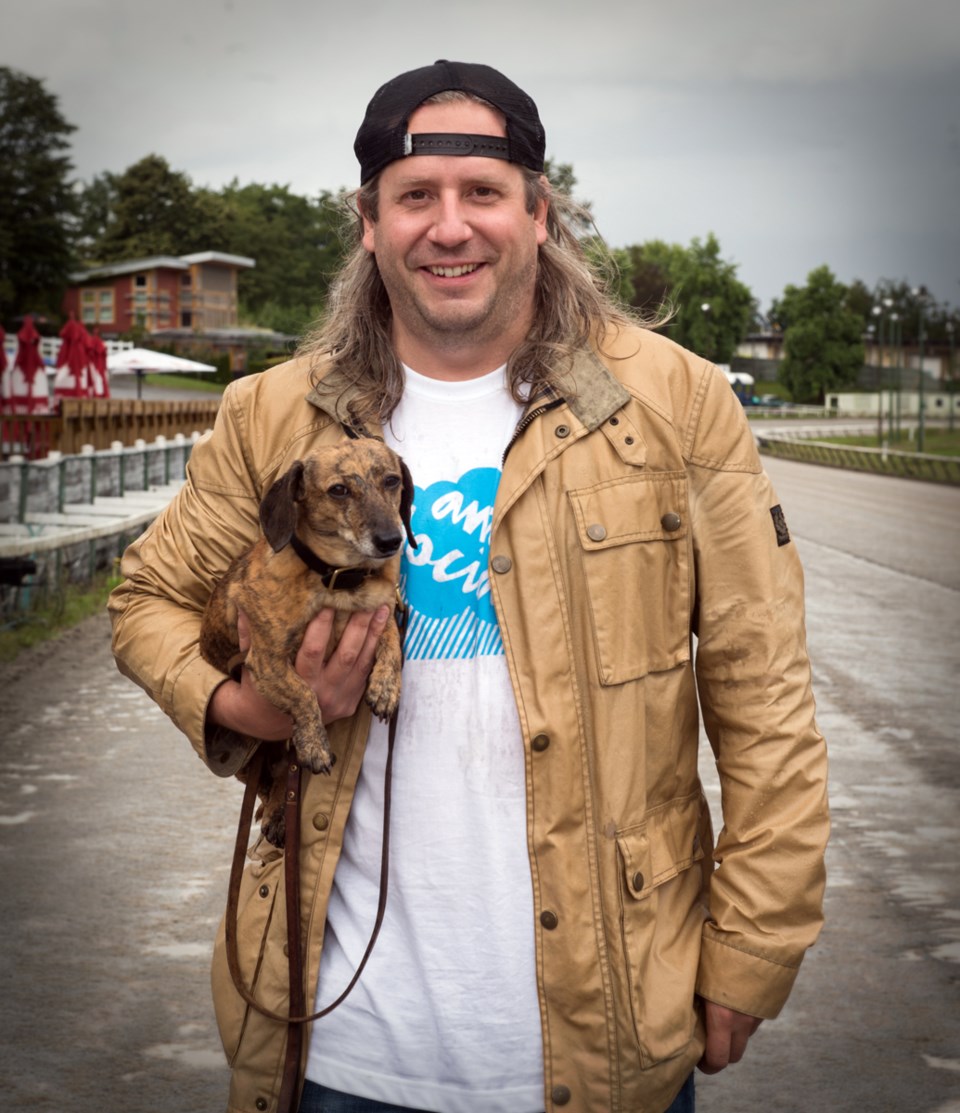
— Richard Wilger on his well-known dachshund dog Hunter. Photo Rebecca Blissett.
Vancouver Aquarium staff and volunteers have gone a little Pokémon crazy in the last week, along with the rest of the world. It was just yesterday I was kind of trash-talking my boss. ‘My Vaporeon is going to beat your Ponyta!’ And we had a little moment of pause where, wow, this is really a conversation that’s happening.
— Derek Jang, the Vancouver Aquarium’s acting assistant manager of interpretive delivery.
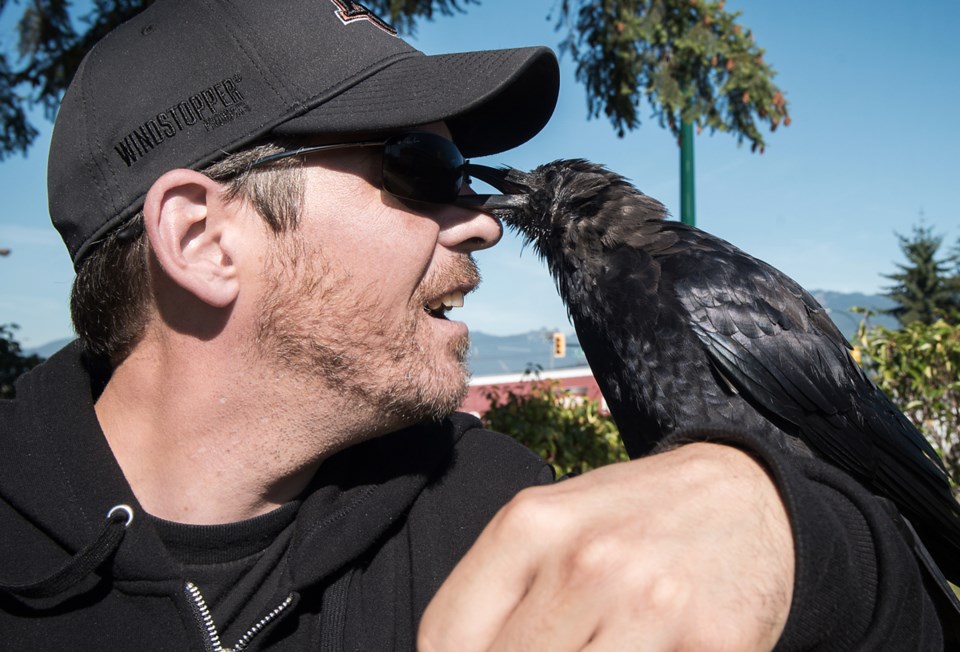
—Shawn Bergman on his unlikely friendship with winged Internet celebrity Canuck the crow. Photo Rebecca Blissett.
My wife wanted one for her birthday so I said I’d make her one. Now I’m weirdly passionate about poop stools because of how awesome it is. I warned my shopmates, I’m going to be talking about this all weekend long.
— Woodworker Jake Maughan on the wooden footstools he designs called Stool Stools that were influenced by his wife whose family has a history of colon disease.
Our society is not really good about dealing with death. We shuffle people off and have someone else to look after that piece. As people suddenly face these issues, they often have no clue what to do, what to say. Somebody dies and a lot of people don’t even know what to say to somebody, which is why the sympathy card business is such a flourishing business.
— Anneke Rees who co-facilitates Death Café events.
I remember in undergrad, living in residence, I was a lot of people’s ‘first Jew.’ I think they’re a little disappointed I’m not a Hasidic-looking version of Jackie Chan.
— Jamie Hsu, on being Chinese and Jewish.
I’m not one of these people who thinks that the decline of Yiddish is the worst thing that ever happened to the Jews. There are a lot worse things that happen to the Jews.
— Faith Jones, a local scholar of Yiddish culture.
Now that I can leave town for more than a week at a time, I will be doing some travelling. Asia sounds like a good destination. Otherwise you’ll still find me at Shindig every so often, probably at the back of the bar. Not sure if I’ll tell a joke for a beer though.
— Ben Lai, former organizer and emcee of CITR’s annual Shindig! battle of the bands on what he’ll do now that he’s hung up his microphone.
WE ARE EVEN HAVING BAG PIPES!!!!!!!!!!! THIS is NO MICKEY MOUSE OPERATION.
— Ruth Enns, enthusiastic organizer of Kitsilano high school Class of 1946’s 70-year “grand finale” reunion at the Marine Drive Golf Club.
Surprises — they are by nature found where you least expect them. That's where the art lies.
— Filmmaker Nettie Wild, on her latest documentary Koneline.
A few years ago, we threw a sausage-themed party and had people dress up as German beer maids. We invited Joyce and Henry, and we have these photos of them sitting on our bed drinking tea with all of us just raging around them. And they were there for hours.
— Bumbles, an East Van skateboarder discussing Joyce and Henry Wong, an elderly couple whom the Hastings Park skateboard community has taken a shine to.
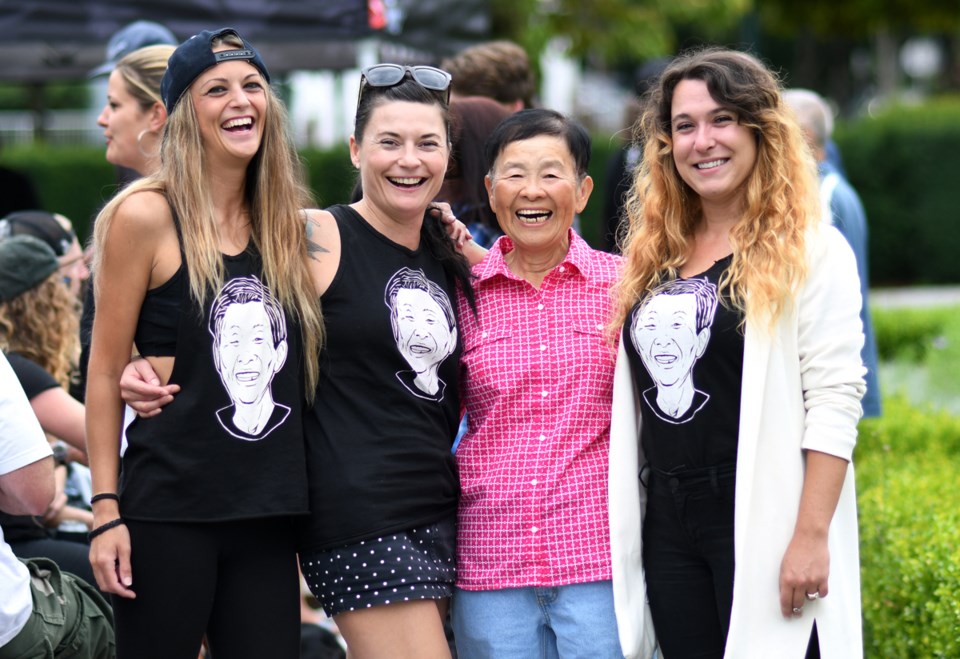
— Joyce Wong, at her 75th birthday party at Hastings Park organized by the skateboarding community. Photo Jennifer Gauthier.
NEIGHBOURHOOD WATCH
It's part of the little boutique history that is West Fourth Avenue. They've already built a lot of condo developments with retail on the bottom further down Fourth and I don't think it has this same sort of feeling. It's anywhere North America rather than this nice feeling of unique little shops.
— Customer Shannon Bradley Dexter, on a 1920s-era building on West Fourth in Kitsilano being knocked down to make way for new development.
Basically, what it will do is it will deny people in this neighbourhood access to calm and access to tranquility. Because, as you probably know, the Downtown Eastside is a neighbourhood with a lot of issues and a great diversity of people. Everything here is in a fairly delicate balance. One way to escape that environment is just to go over to the park and be surrounded by nature and feel that you're part of something bigger.
— Barb Daniel on the battle to stop the westward expansion of the Port of Vancouver, which would affect CRAB Park.
[False Creek Flats is] such a different area for Vancouver and it's wonderful. Every city should have this. It's wonderful for the public to be able to see something that's demonstrating the bowels and the metabolism of the city.
— Louise Schwarz, business owner and member of an advisory committee involved with the planning process for False Creek Flats.
There are a number of different competing interests that need to be reconciled here and that all can be, I think, accommodated in a particularly spectacular and interesting way, but only if everybody is working together.
— Vancouver-Point Grey NDP MLA David Eby on First Nations plan to buy provincial Jericho Lands.
I'm so happy to be on the East Side. The West Side is dying. We lived in Arbutus Ridge, so everyone would say it's beautiful, but it's so quiet. Everyone's working, the kids are in classes every day after school. The kids don't play in the front yard. People don't mow their own lawns. They hire people to do all their gardening. There were maybe five of us on the block who would actually do our own lawns. There was an empty house across the street, an empty house behind us — and just so quiet.
— Taryn Griffiths, after happily moving into Vancouver’s first cohousing complex located in Kensington-Cedar Cottage.
You can't steal a book that's free. That's the conundrum. You're welcome to take them and read them or whatever. It just doesn't seem in the spirit of the book box, of this kind of an exchange, to make a profit off the books that people think they're donating to their neighbour.
— Grandview-Woodland resident Eileen Mosca on some people taking books from the neighbourhood’s book box and re-selling them.
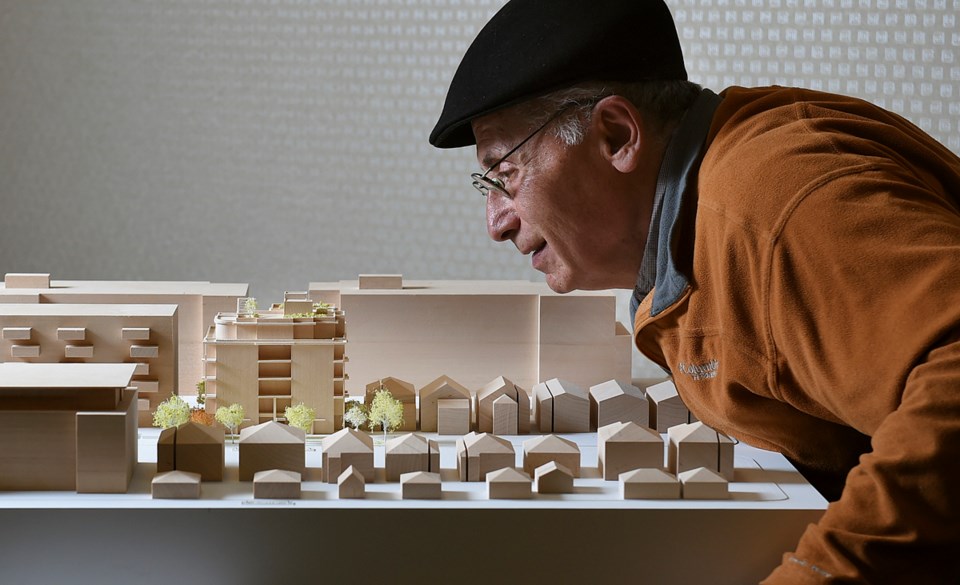
— Jack Brondwin on progress on the city’s second cohousing project — Little Mountain Cohousing — in the Riley Park neighbourhood. Photo Dan Toulgoet.
There are always going to be concerns, but the way I would characterize it is there is something for everyone and everybody had to give up something and often I think that’s the result of a balanced Solomon-like approach.
— Dorothy Barkley, chairwoman of the Grandview-Woodland Area Council on the city’s Grandview-Woodland draft community plan.
Relieved. Very relieved. And Grateful.
— Nancy Keough, executive director of the Kettle Society, after city council voted in favour of the Grandview-Woodland Community Plan, which included a provision allowing council to consider up to 12 storeys for the Kettle site.
ARBUTUS CORRIDOR
This is really Vancouver's chance to have a New York-style High Line, a repurposing of what was freight railroad. This is kilometres of public space that's accessible through our city for all residents to use and connecting many of our neighbourhoods.
— Gregor Robertson, announcing the City of Vancouver’s purchase of Arbutus Corridor for $55 million.
The goal is to get people using more of the corridor. We've heard from people who've lived next to the corridor for decades, but still may have walked only one or two blocks. Our goal is to get people walking much more of it. If you've walked two blocks, walk two kilometres. If you've walked two kilometres, walk eight kilometres. Experience it, see it and use it. And use that experience when you come to our open houses and involve yourself in our consultation process to design what will be a spectacular facility for the City of Vancouver.
— Jerry Dobrovolny, the city's general manager of engineering, after the city started paving a temporary asphalt path along Arbutus Corridor.
We want to encourage citizens who are walkers, and who have children and dogs, to make sure they feel free to get involved in this consultation process. We don’t want to just leave it by default to organized groups and then you get a certain kind of bias from that. I want to make it clear — I’m not opposed to bikes and that they be properly and appropriately accommodated in the greenway. I just don’t think that should be the only reasonable use.”
— Dr. Mark Battersby, one of the critics of using of the asphalt for the temporary path who helped pressure the city to put paving on hold until consultation was held.
There needs to be a recognition of both what’s good for cycling and what’s good for walking and getting people on to an active transportation corridor. In terms of cycling, a hard surface is far preferred. What we find is it promotes the most usership — it’s what most cyclists would prefer to see and that includes families with kids and so on.”
— Jeff Leigh, a spokesman for HUB Cycling, on cyclists’ preference for asphalt on Arbutus Greenway.
I think it strikes a good balance. I’m glad they’ve accommodated all different types of users, so I think it’s a good balance of addressing the different interests. Until we saw the results of the consultation, we didn’t know the way the public opinion was on one side or the other. And given the numbers they’ve shown us, I think it looks pretty reasonable.
— Jeff Leigh, a spokesman for HUB Cycling, on the city’s final decision to use asphalt for the temporary path on Arbutus corridor, with some sections also featuring a bark mulch trail.
Their figures are all designed to support their own position, which was obvious from the start of wanting to asphalt the whole thing. In order to really be able to say you’ve balanced all the views, you’ve got to take into account the non-asphalt group and try the crushed stone in a couple of the sections.
— Elvira Lount, who was unhappy with the city’s decision to use asphalt for the temporary path on Arbutus corridor. She prefers crushed stone.
